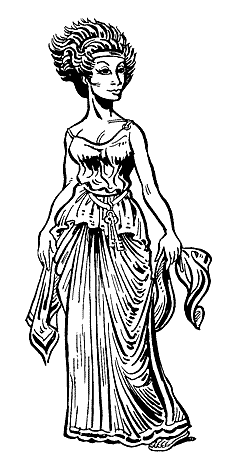Calendar, Anglo-Saxon Frigedaeg
(Frigedaeg, an Anglo-Saxon name for Friday)
Frigg's day
She was known as Frigga, Frigg, Frija, and Fri, but Frigedaeg (Frigg’s day) became Friday in the English calendar.
- The Roman name for this sixth day was dies Veneris, “day of Venus”.
- In old German, she was called Frija; in Anglo-Saxon, Frig; and in old Norse, Frigg.
- According to Teutonic mythology, she was the second and principal wife of Odin and goddess of the clouds and sky, of married love, and housewives.
- A bunch of keys, symbolizing housewives, always hung from her girdle or waist.
- There are ancient poems which say that Frigga and Odin had seven sons who founded the seven Saxon kingdoms in England.
- With her eleven handmaidens, she took care of mortals, smoothing the paths of lovers, presiding over married love, spreading knowledge, and administering justice.
- In Germany, Frigga was identified with, or became confused with Freya, but no such confusion or identity took place in Scandinavian or Icelandic mythology.
- Freya is one of the Vanir (singular, van), a group, or class, of early Teutonic deities who later became associated with the aesir.
- Originally they were fertility gods and later became associated more specifically with weather, crops, and commerce. Frigga was always considered one of the Aesir, or of the Teutonic gods.
- Generally, European folk belief considered Friday to be an unlucky day because Christ was crucified on a Friday.
- It was bad to be born or to get married on a Friday. It was bad luck to take a new job, cut one’s nails, or to visit the sick on a Friday.
- It was thought that if one were to turn in his/her bed on a Friday, there would be no sleep that night.
- Sailors hated to begin a voyage on a Friday; and criminals expected a hard sentence if they were unlucky enough to be tried on a Friday.

I would I could stand on a busy corner, hat in hand, and beg people to throw me all their wasted hours.
